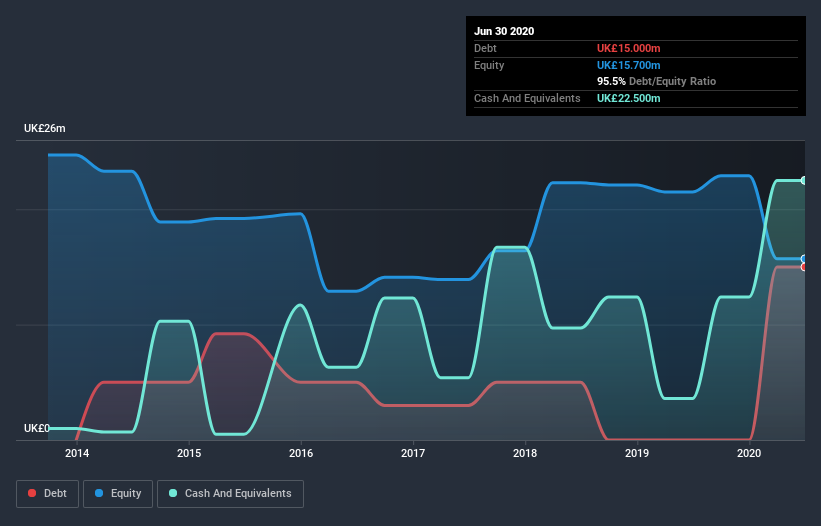Is TClarke (LON:CTO) Using Too Much Debt?

Some say volatility, rather than debt, is the best way to think about risk as an investor, but Warren Buffett famously said that 'Volatility is far from synonymous with risk.' When we think about how risky a company is, we always like to look at its use of debt, since debt overload can lead to ruin. We can see that TClarke plc (LON:CTO) does use debt in its business. But should shareholders be worried about its use of debt?
What Risk Does Debt Bring?
Debt and other liabilities become risky for a business when it cannot easily fulfill those obligations, either with free cash flow or by raising capital at an attractive price. If things get really bad, the lenders can take control of the business. While that is not too common, we often do see indebted companies permanently diluting shareholders because lenders force them to raise capital at a distressed price. By replacing dilution, though, debt can be an extremely good tool for businesses that need capital to invest in growth at high rates of return. When we examine debt levels, we first consider both cash and debt levels, together.
View our latest analysis for TClarke
What Is TClarke's Net Debt?
As you can see below, at the end of June 2020, TClarke had UK£15.0m of debt, up from none a year ago. Click the image for more detail. However, its balance sheet shows it holds UK£22.5m in cash, so it actually has UK£7.50m net cash.
A Look At TClarke's Liabilities
The latest balance sheet data shows that TClarke had liabilities of UK£86.3m due within a year, and liabilities of UK£32.8m falling due after that. On the other hand, it had cash of UK£22.5m and UK£70.9m worth of receivables due within a year. So it has liabilities totalling UK£25.7m more than its cash and near-term receivables, combined.
This deficit is considerable relative to its market capitalization of UK£40.9m, so it does suggest shareholders should keep an eye on TClarke's use of debt. This suggests shareholders would be heavily diluted if the company needed to shore up its balance sheet in a hurry. While it does have liabilities worth noting, TClarke also has more cash than debt, so we're pretty confident it can manage its debt safely.
In fact TClarke's saving grace is its low debt levels, because its EBIT has tanked 29% in the last twelve months. When a company sees its earnings tank, it can sometimes find its relationships with its lenders turn sour. When analysing debt levels, the balance sheet is the obvious place to start. But ultimately the future profitability of the business will decide if TClarke can strengthen its balance sheet over time. So if you want to see what the professionals think, you might find this free report on analyst profit forecasts to be interesting.
But our final consideration is also important, because a company cannot pay debt with paper profits; it needs cold hard cash. TClarke may have net cash on the balance sheet, but it is still interesting to look at how well the business converts its earnings before interest and tax (EBIT) to free cash flow, because that will influence both its need for, and its capacity to manage debt. During the last three years, TClarke produced sturdy free cash flow equating to 66% of its EBIT, about what we'd expect. This free cash flow puts the company in a good position to pay down debt, when appropriate.
Summing up
Although TClarke's balance sheet isn't particularly strong, due to the total liabilities, it is clearly positive to see that it has net cash of UK£7.50m. And it impressed us with free cash flow of UK£7.6m, being 66% of its EBIT. So we are not troubled with TClarke's debt use. The balance sheet is clearly the area to focus on when you are analysing debt. But ultimately, every company can contain risks that exist outside of the balance sheet. To that end, you should be aware of the 5 warning signs we've spotted with TClarke .
If you're interested in investing in businesses that can grow profits without the burden of debt, then check out this free list of growing businesses that have net cash on the balance sheet.
This article by Simply Wall St is general in nature. It does not constitute a recommendation to buy or sell any stock, and does not take account of your objectives, or your financial situation. We aim to bring you long-term focused analysis driven by fundamental data. Note that our analysis may not factor in the latest price-sensitive company announcements or qualitative material. Simply Wall St has no position in any stocks mentioned.
Have feedback on this article? Concerned about the content? Get in touch with us directly. Alternatively, email editorial-team@simplywallst.com.


